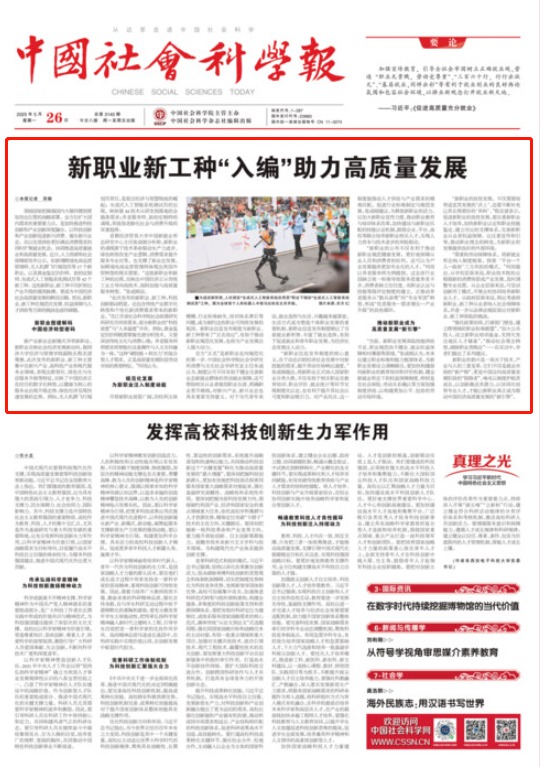
Recently, the Ministry of Human Resources and Social Security announced plans to add 17 new professions and 42 new trades to the national classification system. These include cross-border e-commerce operation managers, drone swarm flight planners, gold appraisers and valuers, travel photography customizers, and generative artificial intelligence system testers. This move is part of China's strategy to strengthen the domestic economic cycle, expand domestic demand, and promote the integration of scientific and technological innovation with industrial innovation, which in turn drives the development of emerging consumption patterns and industries, and creates more job opportunities.
Decoding the New Professions and Trades
The emergence of these new professions and trades reflects the transformation of China's economy.According to Cheng Mingwang, Deputy Dean of the School of Economics and Management at Tongji University,the new additions are mainly concentrated in emerging industries, high-tech sectors, and modern service industries. They are characterized by digitalization, greening, and the upgrading of life services. For example, the rise of drone swarm flight planners is associated with the development of low-altitude economy and smart logistics. The demand for generative artificial intelligence system testers reflects the full chain needs of AI technology from research and development to application. The emergence of elderly care workers and travel photography customizers points to the dual trends of an aging society and consumption upgrading.
Zhang Chenggang, Director of the China New Employment Forms Research Center at Capital University of Economics and Business, believes that the emergence of new professions is driven by technological revolutions, green transformations, and the increasing specialization of consumer demand. These new professions and trades reflect China's economic transition from traditional industry dominance to high technology, high value-added, and high-quality services.
He Yu, a researcher at the Institute of Social Policy of Jiangsu Academy of Social Sciences, points out that some of the new professions combine "high-tech intensity" with "human touch." For example, gold appraisers and valuers need to master spectroscopic analysis technology while also understanding traditional culture and consumer psychology. Elderly care workers are required to integrate the operation of intelligent equipment with human care. This demand for "hard skills plus soft power" composite talents is a typical feature of the labor market in the high-quality development stage.
Normalization Development Injecting Institutional Momentum into New Professions
Despite the promising prospects of new professions, issues such as unclear rights and responsibilities, lack of industry standards, and lagging training systems are bottlenecks that constrain their sustainable development. The official recognition of new professions and trades through the new profession information release system brings a "legitimacy effect," which helps to promote the normalization development of new professions and injects strong momentum into industrial development.
Official "recognition" is the first step towards the normalization of new professions. Zhu Di, Director of the Consumption and Cultural Sociology Research Office at the Institute of Sociology of the Chinese Academy of Social Sciences, believes that institutional recognition not only helps to improve the labor employment protection of new employment groups in new industries and business forms, but also helps practitioners plan their careers and clarify career advancement routes. It also has important support significance for emerging industries and business forms. For contemporary young people, employment choices are increasingly closely related to life and interests, and lifestyle has become an important mechanism for shaping individual career development. The new profession information release system meets the current employment situation, enriches employment choices, helps promote employment and young people's career development, and injects momentum into economic and social development.
Zhang Chenggang proposes that the core significance of the new profession information release system lies in dynamically identifying the demand for new skills in economic and social development and improving the responsiveness of the labor market. Incorporating new professions into the national occupational classification directory not only helps to institutionalize the recognition of related professions in education and training, occupational evaluation, employment statistics, and other aspects, but also helps to improve their social recognition and occupational attractiveness. For industries, this system can promote the precise matching of talent supply and industrial demand and promote the formulation and standardized development of industry standards. Zhang Chenggang suggests that to unleash the vitality of new professions, efforts should be made to increase publicity for new professions, promote the reform of vocational education and training systems, accelerate the construction of skill certification mechanisms matching new professions, and encourage enterprises, platforms, and universities to jointly cultivate talents related to new professions, achieving a dual drive of human capital and technological progress.
He Yu takes the example of elderly care workers to illustrate that in the past, the lack of unified standards in the industry led to uneven service quality and low consumer trust. The establishment of professional certification and skill level assessment systems is driving the transformation of elderly care from "scattered individuals" to a "professional army," forming a virtuous cycle of "high-quality service-demand growth-industry upgrading."
Promoting New Professions as a "New Engine" for High-Quality Development
Zhang Chenggang believes that new professions currently face difficulties such as insufficient skill supply, incomplete occupational norms, and relatively weak employment rights protection. In the future, it is necessary to establish occupational standards and capability framework systems to set clear paths for the development of new professions. It is also important to accelerate the construction of education, training, and evaluation mechanisms for new professions and improve the rights protection system for new employment forms, especially in terms of social insurance and labor relationship confirmation, to build a fairer and more inclusive labor market environment.
Cheng Mingwangpoints out that to promote the benign development of new professions, it is necessary to focus on the cultivation of new professional talents, accelerate the recognition of new professions and vocational skill appraisal, establish corresponding support systems, and improve the rights protection for practitioners of new professions. Efforts should also be made to focus on publicity and guidance, promote the transformation of occupational concepts, and provide a good external environment for the development of new professions.
He Yu proposes that it is necessary to reconstruct the labor protection system, incorporate new employment forms into the institutional framework, and explore a model of shared responsibility among "platforms-individuals-government." From the school level, vocational and technical colleges should adjust their majors in a timely manner according to new consumption scenarios or industrial development. From the enterprise level, companies can try to innovate employment models and conduct collaborative training of new professional talents with schools. From the government level, it is necessary to consider incorporating practitioners of new professions and trades into the social security system and further address the challenges faced by new professions and trades from a legal and regulatory perspective.
In the interviews, scholars have put forward a series of suggestions, such as "strengthening policy coordination, breaking down departmental barriers, and establishing cross-field occupational standard alliances," "increasing public investment and setting up new professional training funds to support talent reserves in less developed areas," and "promoting the transformation of social concepts and breaking the notion of occupational hierarchy."
The rise of new professions is a triple transformation of technology, industry, and people. They are not only "new products" of the job market but also "pathfinders" for China's high-quality development stage. Only by safeguarding their growth with institutions, activating their potential with innovation, and cultivating professional talents in a coordinated manner can new professions truly become a "new engine" for driving the high-quality development of China's economy.
Professor Profile

Cheng Mingwang
Deputy Dean of the School of Economics and Management at Tongji University; "Changjiang Scholar" Distinguished Professor of the Ministry of Education, "Young Changjiang Scholar," "Dongfang Scholar" (Shanghai Distinguished Professor), "Shuguang Scholar," and "Pujiang Talent." He has published more than 70 papers in top or important journals such as "Ecological Economics," "Economic Research," and "Management World." He has presided over more than 10 national social science fund major projects, major projects of philosophy and social science research of the Ministry of Education, national social science fund key projects, and national natural science fund projects. He has won the first and second prizes of "Excellent Research Results of Higher Education Institutions of the Ministry of Education" and the first, second, and third prizes of "Shanghai Philosophy and Social Science Excellent Results," as well as the "Zhang Peigang Development Economics Award."
Research Fields:Public Policy and Macroeconomic Analysis, Labor Economics, Development Economics, and Human Resource Management